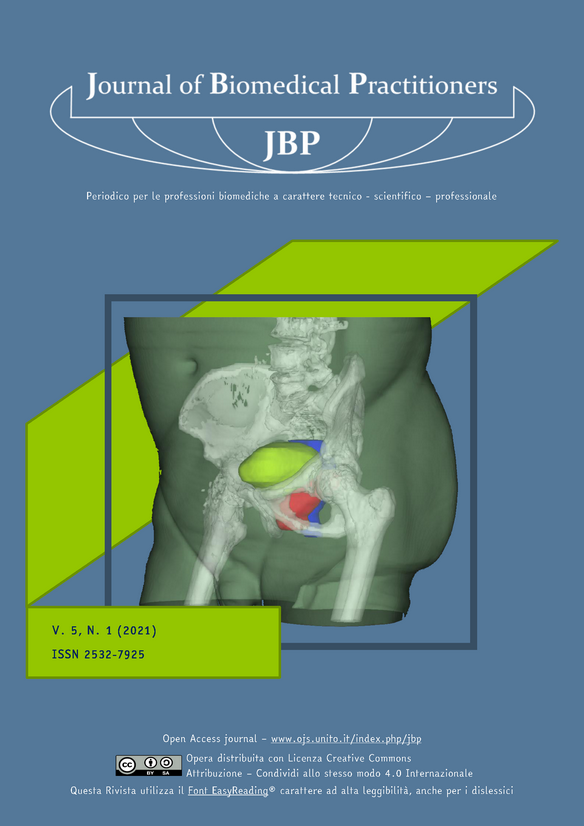Perceived work ability: a survey among health professionals for rehabilitation
Main Article Content
Abstract
Objective
Perceived work ability represents the index of the interaction between worker’s own resources and job’s demands. This perception can be influenced by subjective factors (state of health, individual skills, attitude) and objective factors (work context, organization).
The purpose of this study was to investigate and evaluate perceived work ability and predictors among healthcare professionals in the rehabilitation field.
Materials and Methods
We selected a sample of 57 healthcare professionals from the rehabilitation field. Perceived work ability was investigated through the administration of the Work Ability Index (WAI).
Results
Overall, 57.89% of the total subject (33/57) rank perceived a “Excellent” level of work ability; 26.32% (15/57) perceived a “Good” level of work ability; 10.53% (6/57) perceived a “Mediocre” level of work ability; 5.26% (3/57) perceived a “Poor” level of work ability. A negative correlation (P < 0.01) was highlighted between the total score of the Work Ability Index and the age of the participants. A negative correlation (P < 0.01) was also highlighted between the total score of the Work Ability Index and the years of service of the participants.
Discussion
In accordance with various literature studies, this study highlighted that age was a predictor in worker’s perceived work ability even for healthcare professionals in the rehabilitation field. As the age of the participants increases, there is a lower perceived work ability. We can say the same for the relationship between years of service and scores measured by the Work Ability Index: as the years of service increase, the work ability of the subject decreases.
Conclusions
A low perception of work ability is frequent in older workers with more years of service. This phenomenon affects both the performance of the individual worker and the quality of the service offered by the company in which he works. It is essential to define a multidimensional approach that aims to improve the management of human resources in healthcare in order to maintain good levels of perceived work ability.
Downloads
Article Details
The authors agree to transfer the right of their publication to the Journal, simultaneously licensed under a Creative Commons License - Attribution that allows others to share the work indicating intellectual authorship and the first publication in this magazine.
References
[2] Hasselhorn HM, Tackenberg P, Muller BH. Working conditions and intent to leave the profession among nursing staff in Europe. Stockholm: Working Life Research Report 7, National Institute for Working Life, 2003.
[3] Ilmarinen J. Aging workers. Occup Environ Med; 58(8): 546-52, 2001.
[4] Camerino D, Conway PM, Van der Heijden BI, Estryn-Behar M, Consonni D, Gould D, Hasselhorn HM; the NEXT-Study Group. Low-perceived work ability, ageing and intention to leave nursing: a comparison among 10 European countries. J Adv Nurs; 56(5): 542-52, 2006.
[5] Capodaglio P, Capodaglio EM, Bazzini G, Imbriani M, Ferrari G. Physical workload demands: the combined use of 2 evaluation programs. G Ital Med Lav;1 5(5-6): 117-26, 1993.
[6] Ilmarinen, J. The work ability index (WAI). Occupational medicine, 57(2), 160-160, 2007.
[7] Tomietto, Marco & Zanini, Antonietta & Sgrazzutti, Sasha & Palese, Alvisa. [Work capacity perceived by nurses: descriptive study]. Giornale italiano di medicina del lavoro ed ergonomia. 33. 399-402, 2011.
[8] Costa G., Sartori S., Antonacci G., Olivato D., Bertoldo B. & Ciuffa V. Work ability in hospital workers. In Book of Abstract of The 4th Conference on Ageing and Work, 12–15 June 2002, The Jagiellonian University Medical College, Krakow, Poland, p. 29, 2002.
[9] Costa G. Capacità di lavoro e invecchiamento. La Medicina del Lavoro 91, 302–312. 2000.
[10] Freyer M, Formazin M, Rose U. Factorial Validity of the Work Ability Index Among Employees in Germany. J Occup Rehabil. 29(2):433-442. Doi:10.1007/s10926-018-9803-9, 2019.
[11] Hasselhorn H. Work Ability – Concept and Assessment; 2020.

